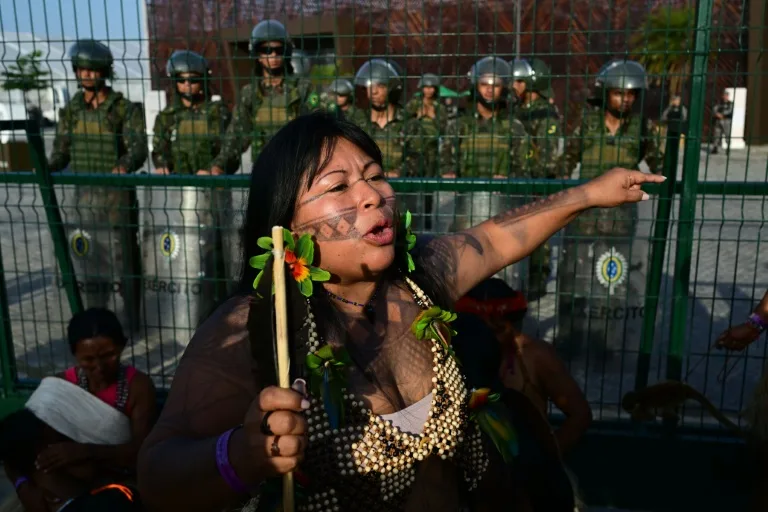Dozens of Indigenous demonstrators blocked the entrance to the UN Climate Summit in Belem, Brazil, on Friday, calling attention to their struggles in the Amazon. Around sixty men and women, some carrying babies and wearing traditional attire and headdresses, formed a human barricade as delegates arrived at the venue.
Under the blazing sun, the group demanded a meeting with Brazilian President Luiz Inacio Lula da Silva. Diplomats were redirected through side doors to enter the summit. This marked the second disruption by Indigenous protesters in the same week.
COP30 President Andre Correa do Lago acknowledged the protesters’ “strong and very legitimate concerns.” He met with the group outside the venue, where they presented a document outlining their demands. The meeting continued in a nearby hall, accompanied by traditional singing, dancing, and chanting. Correa do Lago described the dialogue as “very positive and constructive” and pledged to address all their concerns.
The protesters, mainly from the Munduruku community, seek faster demarcation of their traditional lands and oppose the Ferrograo railway project, a nearly 1,000-kilometer line intended to transport grain across Brazil. “Fighting for our territories is fighting for our lives,” read a banner held by one demonstrator, while Indigenous leader Alessandra Korap urged, “We want to be heard, we also want to participate in the negotiations.”
President Lula, a self-proclaimed ally of Indigenous causes, has taken steps to protect tribal groups, reduce Amazon deforestation, and establish Brazil’s first Ministry of Indigenous Peoples. However, critics cite delays in land demarcation and recent oil exploration near the Amazon mouth as ongoing issues.
The protests follow earlier clashes when Indigenous groups and supporters briefly stormed the summit venue. Despite heightened security with armed soldiers and police guarding entrances, the UN assured attendees that there was “no danger.” After roughly two hours, delegates could access the main entrance, allowing the summit to continue.
The demonstrations highlight the urgency of Indigenous voices in global climate discussions and their fight to protect the Amazon—a critical front in the battle against climate change.

